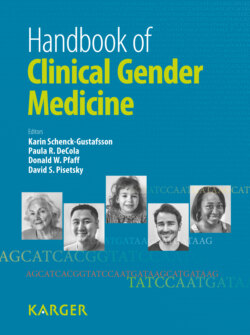Читать книгу Handbook of Clinical Gender Medicine - Группа авторов - Страница 125
На сайте Литреса книга снята с продажи.
Psychosocial Factors
ОглавлениеBecause women have less power and status than men in most societies, they experience certain traumas more often than men do. Both physical and sexual abuses have been consistently linked to women’s high rates of depression, and childhood sexual assault appears to be a particularly powerful predictor of depression even into adulthood [11]. Emotional abuse, neglect, parental loss, and other childhood adversities are also risk factors for depression, particularly in girls and women. Furthermore, adults who live in poverty are twice as likely to suffer new incidences of depression, as are middle-and upper-class adults, and women are more likely than men to have incomes below the poverty line [12].
Even when women and men experience the same stressful life events, women may be more likely than men to develop depression because of sex differences in self-concepts or coping styles. Women are more likely than men to feel strong emotional ties with a wide range of people in their lives and to see their roles as caregivers and partners as central to their self-concepts. Developing strong social support networks can protect women against adversity; however, excessive concern over relationships may cause women to put aside their own wants and needs. Women’s greater interpersonal orientation may create more interpersonal stress in their lives and make them more vulnerable to stress when it occurs. Furthermore, men and women often use different coping styles in stressful situations. Women are more likely than men to ruminate in response to depressed or anxious moods, and researchers suggest that rumination contributes to the higher prevalence of depression in women [13].
